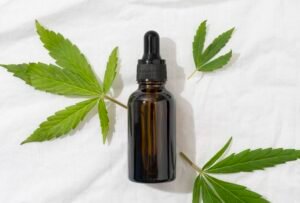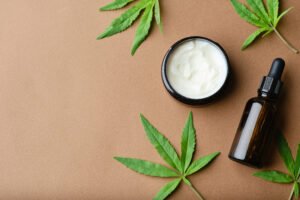Psoriasis, an immune system-linked skin condition, presents as red, scaly patches and inflammation. About 30% of psoriasis patients also grapple with psoriatic arthritis, causing joint pain, fatigue, and more. This chronic condition increases the risk of heart disease, kidney issues, depression, and more. With these complex challenges, individuals with psoriasis often explore alternative treatments, including cannabis for psoriasis, to harness potential anti-inflammatory benefits and improve their overall well-being.
What Is Cannabis for Psoriasis?
CBD, short for cannabidiol, is one of over 80 biologically active compounds found in the cannabis plant. These compounds, known as cannabinoids, have various effects on the body, including anti-inflammatory, antioxidant, and psychological effects.
Despite the availability of effective treatments for psoriasis, many patients continue to experience chronic itching and pain. Moreover, they often deal with the stigma and psychosocial consequences of this visible skin condition. Understandably, individuals living with psoriasis explore alternative treatments, and one such option is cannabis-based products containing CBD.
Also Read: Cannabis Hyperemesis Syndrome
The medical community is just beginning to unravel the potential benefits and risks associated with cannabis-derived products. The effects of CBD can vary depending on factors like the method of delivery (topical application, inhalation, oral ingestion), the concentration of the cannabinoid, and the specific chemical compounds isolated from particular strains of the plant.
However, it’s a reasonable assumption that cannabinoids, including CBD, could have potential beneficial effects such as reducing anxiety and inflammation, which might help alleviate the challenges associated with psoriasis. Further research is needed to fully understand how cannabis for psoriasis can be harnessed to improve the lives of those with this condition.
Causes of Psoriasis
While the exact causes of psoriasis remain a subject of ongoing research, several recognized risk factors have been identified, including family history, infections, stress, obesity, and smoking. Psoriasis can be triggered or exacerbated by various factors, and understanding these triggers is essential for effective management. Here are some of the key factors:
1. Family History: One of the most significant risk factors for psoriasis is a family history of the condition. If a close relative, particularly a parent, has psoriasis, an individual is at a higher risk of developing the condition themselves.
2. Infections: Certain infections, both viral and bacterial, can trigger or worsen psoriasis symptoms. Streptococcal infections, in particular, have been associated with psoriasis flare-ups.
3. Stress: Emotional stress and anxiety can have a notable impact on psoriasis. Many individuals report that high-stress levels can trigger or exacerbate their psoriasis symptoms.
Also Read: Purple Kush
4. Obesity: Being overweight or obese is linked to an increased risk of developing psoriasis. It’s believed that the inflammation associated with excess body fat may contribute to the development of the condition.
5. Smoking: Smoking not only increases the risk of developing psoriasis but can also worsen existing symptoms. Quitting smoking is advisable for individuals with psoriasis to manage their condition effectively.
6. Alcohol Consumption: Heavy alcohol consumption, particularly in men, has been associated with psoriasis. Reducing alcohol intake or abstaining from alcohol may help in managing psoriasis symptoms.
7. Vitamin D Deficiency: Vitamin D plays a role in skin health, and a deficiency in this essential vitamin can be a risk factor for psoriasis or lead to more severe symptoms.
8. Certain Medications: Some medications, including lithium, antimalarial drugs, and specific beta-blockers, have been known to trigger or worsen psoriasis in susceptible individuals.
Understanding the Risk Factors Is Essential for Individuals Living with Psoriasis
It is possible to better control psoriasis symptoms and improve overall quality of life. However, it’s crucial to consult with a healthcare professional for a comprehensive management plan tailored to individual needs. Additionally, exploring alternative treatments, such as cannabis for psoriasis, is gaining attention as a potential option for managing this condition.
Cannabis, with its array of cannabinoids, may offer several potential benefits for individuals dealing with psoriasis, making it a topic of growing interest in the context of cannabis for psoriasis:
1. Reducing Inflammation: Research suggests that cannabinoids have anti-inflammatory properties that can modulate the body’s inflammatory responses, which is crucial when considering the potential of cannabis for psoriasis. This is a critical aspect of psoriasis treatment as it can help alleviate pain, scaling, and other symptoms associated with the condition.
2. Slowing Cell Growth: Psoriasis involves the rapid reproduction of skin cells. Cannabinoids may influence skin cell growth and reduce their accumulation on the skin’s surface, making this a relevant point in the discussion of cannabis for psoriasis. However, more controlled human research in this area is needed to confirm this effect.
3. Controlling Pain: Scientific evidence indicates that cannabinoids have the capacity to relieve pain and reduce the use of opioid pain medications, which is pertinent in the context of cannabis for psoriasis. This property may be particularly beneficial for individuals with psoriasis and psoriatic arthritis, helping them manage the pain and discomfort associated with these conditions.
Also Read: Synthetic Cannabis
4. Reducing Itching: The cannabinoids found in cannabis may provide relief from itching, a common symptom of various skin conditions, including psoriasis. Research has shown that certain compounds affecting cannabinoid type-1 receptors can effectively reduce itching in conditions such as prurigo, lichen simplex, and pruritus, underscoring the potential role of cannabis for psoriasis.
It’s important to note that while these potential benefits are promising, more research, especially controlled human studies, is necessary to fully understand the extent to which cannabis for psoriasis can be harnessed as a treatment option for this skin condition. As the medical community delves deeper into this area, individuals with psoriasis and psoriatic arthritis may gain new insights into managing their conditions effectively.
How Marijuana Helps with Psoriasis Symptoms
Psoriasis is a prevalent skin condition that afflicts many individuals. It is characterized by the development of red, itchy, and scaly skin patches that can often be painful. The treatment approach for psoriasis can vary depending on its severity, and individuals may experience periods of flaring symptoms followed by remission.
Understanding the different types and locations of psoriasis is essential for accurate diagnosis and tailored treatment plans. While psoriasis remains a challenging condition to manage, advances in medical research and therapy continue to provide hope for those affected by this chronic skin disorder.
Cannabis for Psoriasis is a topic of growing interest among individuals seeking alternative or complementary treatments. Recent studies have explored the potential benefits of Cannabis for Psoriasis management, shedding light on its role in mitigating symptoms and improving the quality of life for those living with psoriasis.
Scalp Psoriasis
Scalp psoriasis manifests as thick, crusty, and white skin patches that primarily affect the scalp. These patches often have a powdery appearance with a silver sheen. It’s worth noting that scalp psoriasis can sometimes be mistaken for seborrheic dermatitis, a condition characterized by yellow, crusty, and oily patches. Interestingly, the presence of scalp psoriasis may also indicate a risk of Psoriatic Arthritis (PsA), as many patients with PsA exhibit symptoms of both the scalp and arthritic forms.
Genital Psoriasis
Cannabis for Psoriasis has gained attention as a potential complementary treatment for genital psoriasis. Genital psoriasis primarily affects specific areas, including the creases between the thigh and genital area, the vulva, penis, or scrotum, the crease between the buttocks (including the skin around the anus), the pubis or skin above the genitals, and the inner and upper thigh. Genital psoriasis can take the form of plaque psoriasis or inverse psoriasis. Research into the use of Cannabis for Psoriasis suggests that its anti-inflammatory properties may offer relief to individuals dealing with this condition.
Facial Psoriasis
Cannabis for Psoriasis management is a subject of growing interest among those with facial psoriasis. Approximately 50% of psoriasis patients have symptoms on their faces. Facial psoriasis typically occurs in areas around and behind the ears and can extend into the ear canal. Although rare, facial psoriasis can also affect the mouth, including the gums, lips, tongue, and cheeks. Psoriasis around the eyes is extremely rare but can cause discomfort and potentially impair vision. Exploring the potential use of Cannabis for Psoriasis on the face is an area where ongoing research may yield valuable insights.
Also Read: Caffeine and Cannabis
Inverse Psoriasis (Intertriginous Psoriasis)
Inverse psoriasis, also known as intertriginous psoriasis, is characterized by skin lesions that appear purplish, brown, or darker than the surrounding skin. This type of psoriasis is commonly found in skinfold areas such as the armpits, groin, under the breasts, and various other skin folds on the body. For individuals with this form of psoriasis, the exploration of Cannabis for Psoriasis as a complementary treatment option could offer potential relief from the discomfort and irritation associated with these skinfold areas.
Palmoplantar Psoriasis (PPP)
Cannabis for Psoriasis is an area of growing research and discussion among individuals dealing with palmoplantar psoriasis (PPP). PPP specifically affects the hands, feet, fingernails, and toenails. The pain and discomfort associated with PPP can significantly impact an individual’s daily life. Researchers are investigating the anti-inflammatory and pain-relieving properties of Cannabis for Psoriasis to determine its potential efficacy in managing this type of psoriasis.
Different Types of Psoriasis
Beyond these location-specific manifestations, psoriasis also exhibits distinct types, each with its own characteristics:
- Plaque Psoriasis is the most common type, affecting 80-90% of patients. It typically appears as raised, inflamed, and scaly patches on the scalp, knees, elbows, and torso. Research into the potential use of Cannabis for Psoriasis continues to explore its anti-inflammatory properties and their impact on plaque psoriasis symptoms.
- Guttate Psoriasis has sparked interest in the context of Cannabis for Psoriasis due to its prevalence in younger individuals. This type presents as small, round, raised papules that can be scaly. While it usually appears on the arms, legs, and torso, it can sometimes affect the face, ears, and scalp. Research indicates that infections, such as strep throat, can trigger guttate psoriasis, and investigations into the anti-inflammatory properties of Cannabis for Psoriasis are ongoing.
- Pustular Psoriasis comes in two forms: General pustular psoriasis (GPP) and localized pustular psoriasis. For individuals dealing with the challenges of pustular psoriasis, the potential use of Cannabis for Psoriasis is an area of interest. Researchers are exploring how Cannabis for Psoriasis may help alleviate symptoms and improve the overall quality of life for those with this condition.
- Erythrodermic Psoriasis is a rare and severe form of psoriasis. For the small percentage of individuals affected by this type, the condition can be life-threatening. Researchers are investigating how Cannabis for Psoriasis may assist in managing the severe symptoms of erythrodermic psoriasis. Its potential anti-inflammatory and pain-relieving properties may offer relief to individuals facing the challenges of this condition.
In conclusion, as Cannabis for Psoriasis research continues to evolve, it offers a promising avenue for individuals seeking complementary approaches to manage the various types and locations of psoriasis. While further research is needed to fully understand the potential benefits and mechanisms of action, it’s clear that Cannabis for Psoriasis is a topic of growing interest and holds promise for enhancing the quality of life for those living with this chronic skin disorder.
FAQs
Q. How can cannabis for psoriasis help with psoriasis?
A. Cannabis contains cannabinoids, such as CBD, which have anti-inflammatory, antioxidant, and psychological effects. These properties can potentially reduce inflammation, slow skin cell growth, control pain, and relieve itching associated with psoriasis.
Q. What are the known risk factors for psoriasis?
A. Recognized risk factors for psoriasis include family history, infections, stress, obesity, smoking, alcohol consumption, vitamin D deficiency, and certain medications. These factors can trigger or exacerbate psoriasis symptoms.
Q. How does cannabis reduce inflammation in psoriasis?
A. Cannabis cannabinoids can modulate the body’s inflammatory responses, helping to alleviate inflammation in psoriasis. This is crucial for managing pain, scaling, and other symptoms of the condition.
Q. Can cannabis slow down the rapid skin cell growth in psoriasis?
A. There is some evidence to suggest that cannabinoids may influence skin cell growth, potentially reducing their rapid accumulation on the skin’s surface in psoriasis. However, more research is needed to confirm this effect.
Q. What should individuals with psoriasis consider when exploring cannabis as a treatment option?
A. When considering cannabis for psoriasis, individuals should consult with a healthcare professional to develop a comprehensive management plan. Additionally, they should stay informed about ongoing research in this area to maximize the potential benefits and safety of using cannabis for psoriasis.
Q. What further research is needed regarding cannabis for psoriasis?
A. More controlled human studies are needed to better understand the full extent to which cannabis can be harnessed as a treatment option for psoriasis. Ongoing research is essential to gain a deeper understanding of the mechanisms at play and maximize the benefits of cannabis for psoriasis management.








